North Carolina is known for its breathtaking natural scenery. With its lush pine trees, sandy beaches, and mountain ranges, it’s no wonder why North Carolinians enjoy spending so much time outdoors.
That said, there’s nothing finer than to kick back in North Carolina in your own backyard. Adding a pool in North Carolina or renovating an older swimming pool can give you even more enjoyment and provide you with a relaxing place to cool off during scorching Carolina summers. Beyond relaxation, a pool can be a gathering place for loved ones – giving you a place to make generations-worth of memories.
North Carolina has hot summers and generally pleasant weather year-round. In winter, temperatures reach an average high of 51 degrees and snow is a rarity. While that’s a little brisk for some North Carolinians, many are still able to enjoy a heated inground pool during cooler months, wringing the most out of pool season.
If you’re thinking of taking the plunge on pool ownership in North Carolina, we’ll walk you through some of the basics – including the benefits of popular fiberglass and vinyl liner pool types, as well as what yo can expect in the terms of pool maintenance and making sure your pool conforms to state and local guidelines. Let’s dive in!
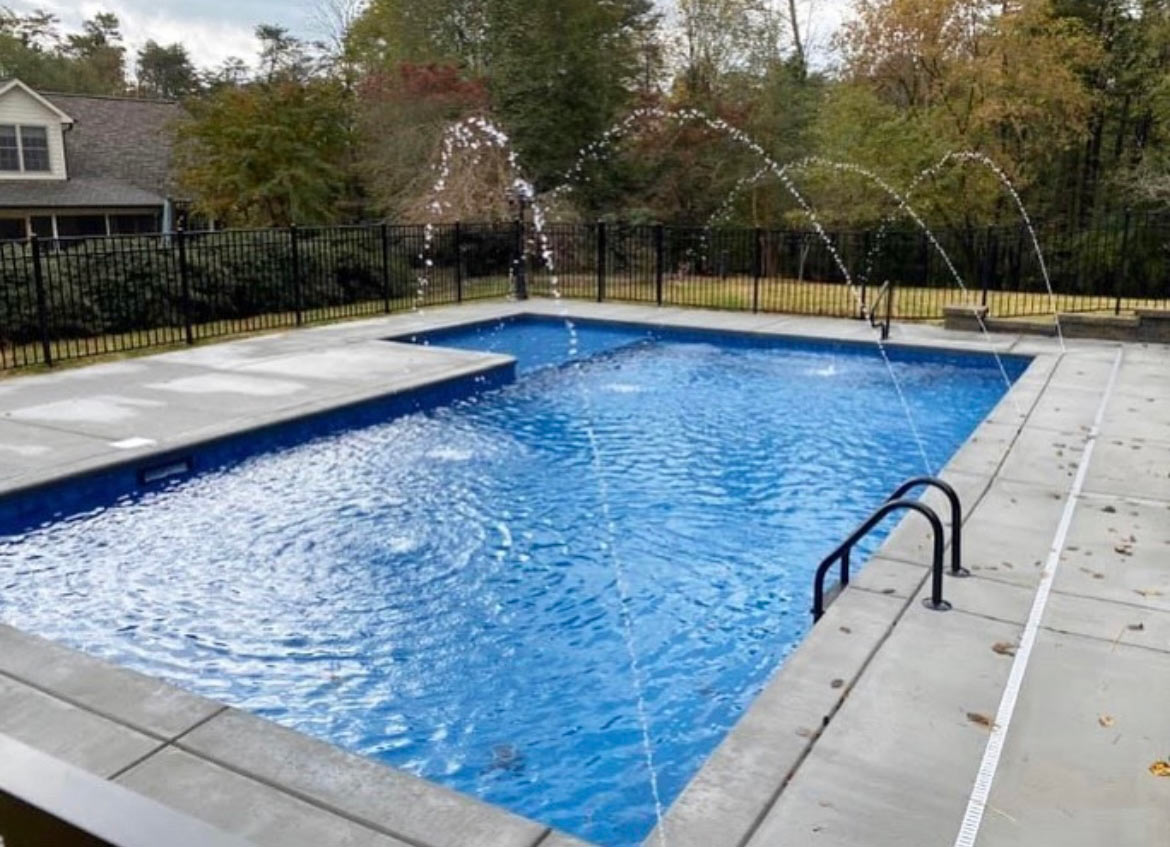
North Carolina Fiberglass Pools
Fiberglass pools have become an overwhelming favorite with North Carolina homeowners for a number of reasons. In terms of longevity, a well-maintained fiberglass pool can last between 25 to 30 years – or potentially longer! Their smooth, glossy surface makes them just as easy on the eyes as they are on your feet, with no rough walls or floors to make for an unpleasant wading experience.
“I believe fiberglass inground pools are great for North Carolina residents. The fiberglass pool is a great option for people to get benches and ledges in a pool, which seem to be the latest trend, while giving them the peace of mind of a warranty that the pool will last,” says Jarret Cope of Magic Pools and Spas.
If you’re new to pool ownership, fiberglass pools are also easy to care for and don’t require as stringent a time commitment as other materials, such as concrete or gunite. They’re also easier and faster to install, as fiberglass pool shells are pre-fabricated. And the faster your pool gets installed, the sooner you can begin enjoying it!
Whether you live in metropolitan hot spots like Raleigh or Charlotte, or in one of the many smaller towns that dapple The Tarheel State, Latham has been helping North Carolinians become pool owners for decades. Ready to start exploring some of the most popular shapes and designs of fiberglass inground pools in North Carolina?
Fiberglass Pool Designs for Your North Carolina Home
From classic Greco-Roman models to splashier freeform styles, pools come in a variety of shapes and sizes. When making your decision, there’s a pool to suit every backyard and every personality. Here are some of the most common fiberglass pool shapes and some of our favorite models that can serve as a springboard for your backyard inspiration:
- Rectangular – If you’re looking for lines as crisp and clean as your pool’s water, rectangular shaped fiberglass pools can’t be beat. Their classic shape is timeless and rectangular pools are offered in varying lengths and depths. Some of our favorite models include:
- Astoria – The Astoria is a real crowd-pleaser, made with giving you the most mileage from your pool. It offers a built-in spa, swim-up seating for enjoying a good beverage and better conversation, a wading area for smaller swimmers and plenty of room to swim and splash!
- Olympia 12 – With its classic good looks, the Olympia works with any backyard aesthetic. This inviting rectangular pool has swim-up seating alongside ample space to relax, float, and swim.
- Barcelona – Simple and elegant, the Barcelona has curved stairs for a graceful entrance and exit. It offers both a shallow and deep end – perfect for entertaining, relaxing or exercising.
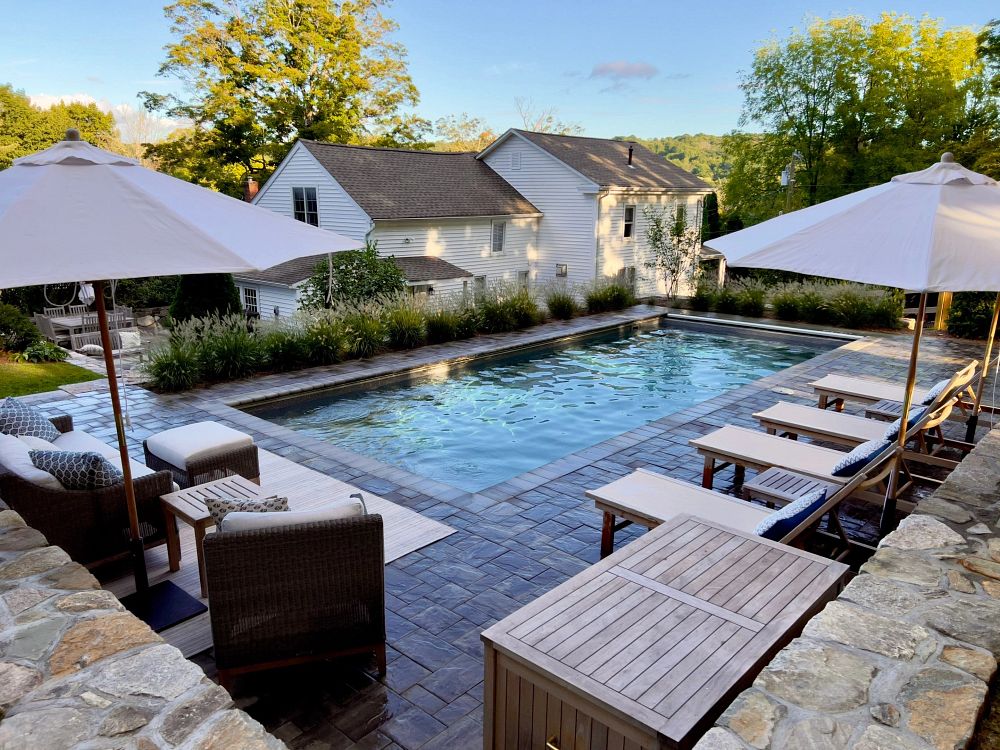
- Freeform – Freeform pools are the perfect fit for large, small or irregularly shaped yards. They come in a wide range of shapes and sizes, giving you plenty of room for personalization and add-ons. Here are just a few freeform pools to fall in love with:
- Axiom 12 Deluxe – The very model of a modern freeform pool, the Axiom 12 Deluxe offers swim-up seating, multiple points of exit and entry – not to mention a built-in spa for maximum relaxation. The Axiom 12 Deluxe offers ample room to splash and play, as well as slip-resistant steps, ensuring fun and safety are the order of the day!
- Key West – The Key West unlocks all the beauty and potential for fun of a freeform pool. With slip-resistant corner steps, it offers more room to swim, socialize and take it easy. It also offers plenty of space for add-ons like a tanning ledge to help make your pool an even more inviting place to be!
- Cancun – The Cancun makes a statement: “Let’s have some fun!” Big and bold, with plenty of built-in benches and seating, the Cancun also features gorgeous Crystite Color Technology, beckoning you to come enjoy a cool dip. Slip-resistant steps keep the party going by making safety a prime feature for swimmers of all ages.
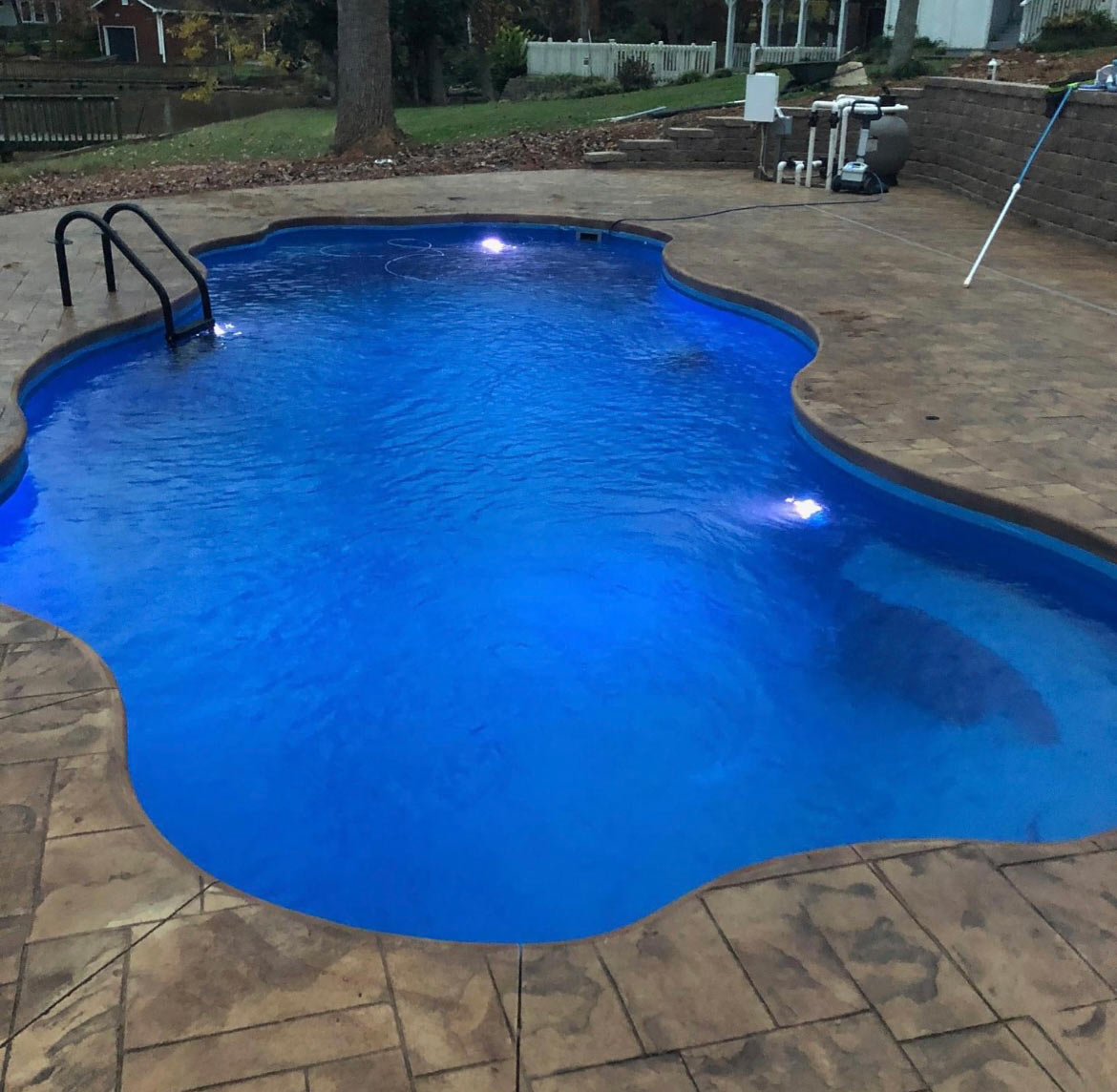
- Plunge – Who says big yards get to have all the fun? Plunge pools are an ideal option for smaller yards, giving you all the excitement of a larger pool in a smaller, more compact size. Not only are they a great choice for active homeowners who want to use their pool to exercise, but are equally suited to play.
- Milan: With its elegant rectangular shape and Crystite Color Technology, the Milan looks beautiful and unleashes a world of fun for smaller yards. Available in a compact 10’ x 16 size, the Milan offers swim-up seating and plenty of space to swim laps or relax with company.
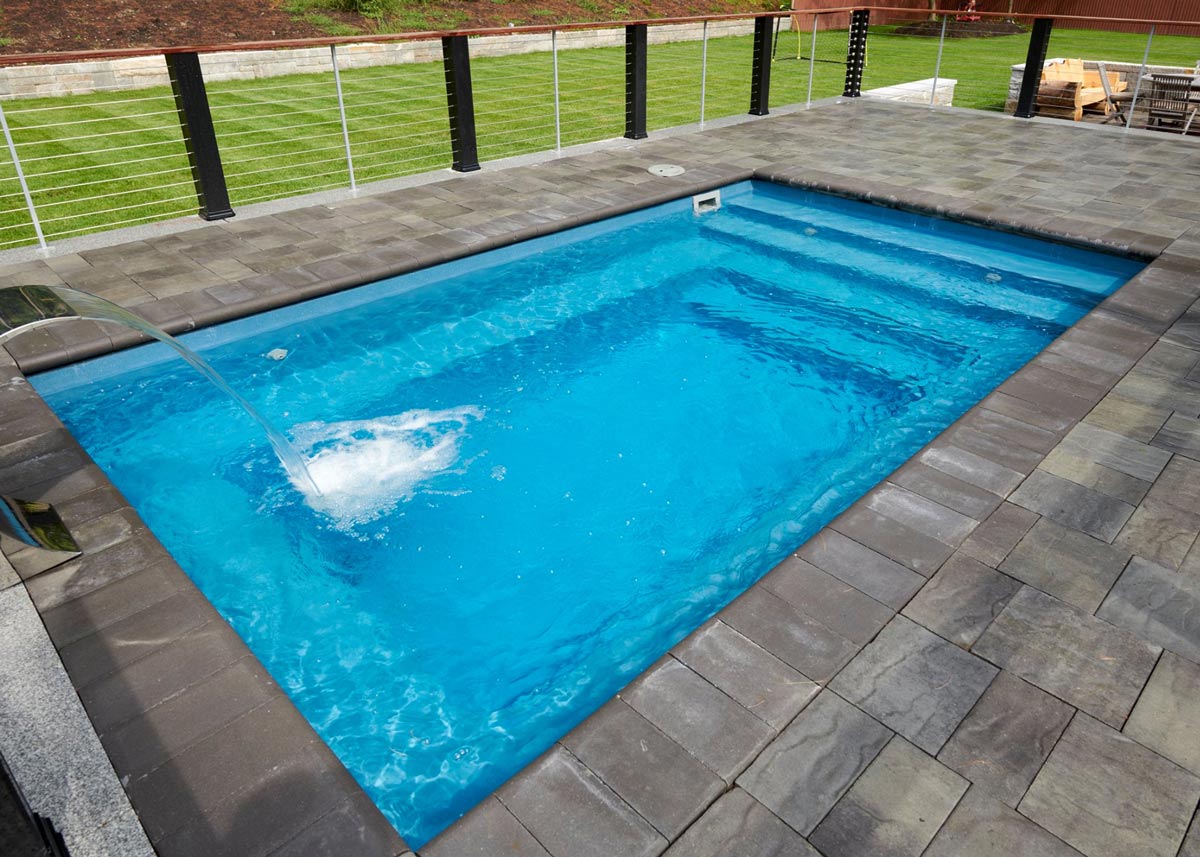
- Kidney – Can’t decide between a more traditional shape or a free-form style? Kidney-shaped pools offer the best of both worlds – especially if you have a small yard. Here are a few options that can help you maximize the fun factor of your backyard:
- Jamaica – For a tropical getaway without the plane fare, the Jamaica offers a luxurious vacation in the privacy of your own backyard. Its compact size, swim-up seating and beverage benches make it the place to be!
- St. Lucia – Striking and spacious, the St. Lucia is a feast for the senses with its tiered wedding cake steps and versatility. It can be customized with your choice of features, such as a tanning ledge – and still has plenty of room to splash, relax and play host to your lucky guests.
- Valencia – With its beautiful curved lines and swim-up seating, the Valencia is more than just a pretty face. Sure, it has breathtaking Crystite Color Technology, but offers tons of space to splash and play, as well as slip-resistant steps.
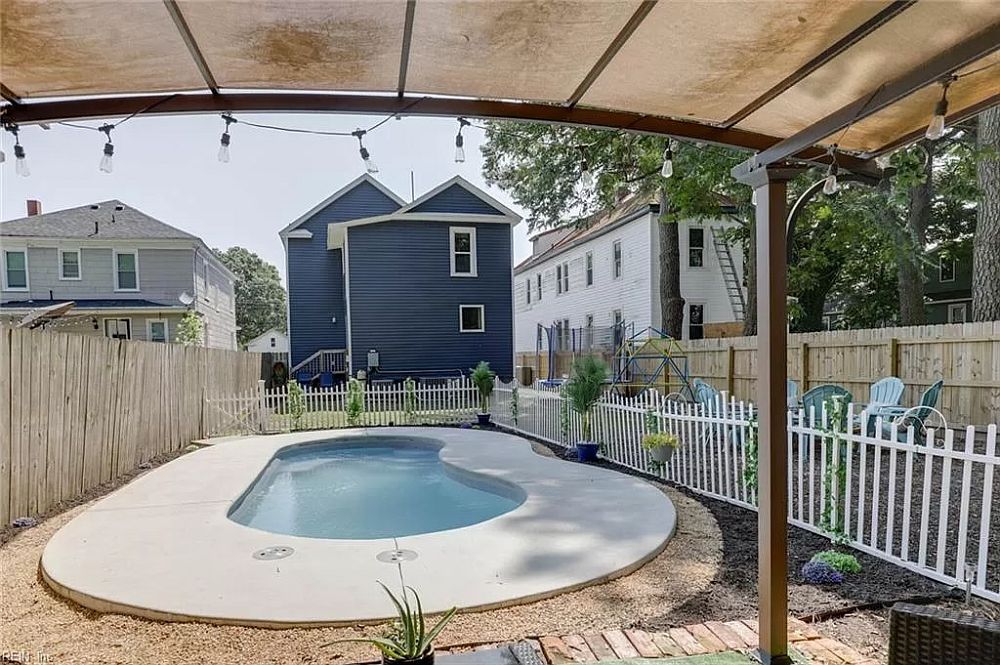
Transforming or Replacing Your Current Pool
Concrete (or gunite) pools are among some of the oldest pools in existence. However, pool technology has improved dramatically since concrete pools became a backyard mainstay during the mid-20th century. Fiberglass pools are an ideal fit if you’re planning on renovating or replacing an existing pool and bringing it into the 21st century.
Maintaining a concrete pool can be a lot of work. They require a rigorous maintenance schedule, as concrete is porous. This can make the surface of a concrete pool rough and chalky over time – not the best look for the crown jewel of your backyard!
Concrete’s porous nature also makes these pools more susceptible to developing algae, which can create unsightly stains on your pool walls and also throw off the delicate balance of your water chemistry.
If you’re tired of battling with your concrete pool, replacing it with a brand new fiberglass model can give your swimming pool a new lease on life. Fiberglass pools have a number of advantages. They offer a beautiful finish that won’t snag your bathing suit and feels wonderful on the soles of your feet when wading in. Plus, a well-maintained fiberglass pool requires only a fraction of the upkeep of concrete and lasts for decades. A fiberglass pool frees you from a hefty maintenance schedule, giving you more time to make memories and years of enjoyment.
North Carolina Pool Regulations
A pool can give you a springboard for making countless memories with friends and family. However, owning a pool also means accepting responsibility and making sure your pool is safe for everyone to use.
If you’re planning on buying a new pool, or your North Carolina home has an existing pool, do your homework and be sure your pool is compliant with the most recent state and local regulations. Rules and ordinances can change over time, and from municipality to municipality. Staying up-to-speed on any changes can ensure your pool stays compliant.
Here are some of the most common questions we hear about North Carolina pool regulations:
- What is the maximum pool depth for a residential pool in North Carolina?
While North Carolina does not have a maximum pool depth requirement for any residential swimming pools, according to the NC state Building Code, it does classify “any structure intended for swimming or recreational bathing that contains water over 24 inches (610 mm) deep” as a swimming pool. This includes in-ground and above-ground pools, as well as hot tubs and spas. These structures are subject to all the rules and regulations mandated of swimming pools by the state of North Carolina. - How far does a residential pool have to be from a building, like your house?
In North Carolina, it’s important to check with your local building office, as regulations around how far a pool should be from a residential building can vary across different cities and towns.For instance, Dare County, North Carolina requires that “all components of a swimming pool, including the pool apron” must be at least five feet from the side or rear property line.By contrast, Spencer, NC mandates that residential swimming pools “shall not be located in any front or side yard and shall not be less than 10 feet from any lot line.Because residential pool requirements can vary from town to town, it’s important to do your homework and confirm local building codes before breaking ground on a new pool. Additionally, working with a knowledgeable professional pool builder can help you better understand your local requirements and navigate the permitting process. - Do you need a fence around an inground pool in North Carolina?
North Carolina residential pool owners must have a fence around an inground pool – or any water-holding structure the state classifies as a pool. While the North Carolina State Building Code: Residential Code mandates that all pools be enclosed by a barrier at least 4 feet high, the state has robust rules and regulations for barriers and specific requirements based on the style and type of fencing material you use.According to the NC Building code, any outdoor swimming pool (including in-ground, above-ground or on-ground swimming pools, hot tubs or spas) must have a barrier around it. “The top of the barrier shall be at least 48 inches (1219 mm) above grade measured on the side of the barrier which faces away from the swimming pool. The maximum vertical clearance between grade and the bottom of the barrier shall be 2 inches (51 mm) or 4 inches (102 mm) where concrete or fixed solid material is used measured on the side of the barrier which faces away from the swimming pool.”Additionally, for slat-style fences, North Carolina requires that openings or slats in the barrier shall not allow passage of a 4-inch diameter (102 mm) sphere. This is to ensure small children or family pets cannot squeeze through. If a North Carolina resident opts for a chain link fence instead, the mesh size “shall be a 2 ¼-inch (57 mm) square unless the fence has slats fastened at the top or bottom that reduce the openings to not more than 1 ¾ inches (44 mm). For lattice-style fencing, the code regulates that “the maximum opening formed by the diagonal members shall not be more than 1 ¾ inches (44 mm).”Rules and regulations can change over the years, and your own city or town may have even more stringent requirements. It’s important to do your research and be sure your pool meets all current codes. Working with a licensed professional builder can help you better understand what is required of you and your pool. - Are pool covers required, and if so, what kind?
North Carolina requires residential pool owners to have a powered safety pool cover if an outer wall of their home serves as part of the barrier (or fencing) around the pool.More specifically, according to the 2018 North Carolina State Building Code: Residential Code, in instances where a wall of a dwelling serves as part of the barrier (or fencing) around the pool, the pool shall either “(9.1) be equipped with a powered safety cover in compliance with ASTM F1346 or (9.2) doors with direct access to the pool through that wall shall be equipped with an alarm that produces an audible warning when the door and/or its screen, if present, are opened.”
North Carolina Seasonality
North Carolina’s warm weather and virtually non-existent winters make it well-suited to almost year-round pool weather. The state’s natural beauty pretty much compels residents to spend as much time outdoors as possible. Adding a pool to your backyard can give you even more of an excuse to soak in the scenery, while soaking up some sun with a cool beverage in-hand.
The average temperature during North Carolina summers ranges between 80 and 90 degrees, with fall temperatures averaging around 70 degrees. During winter months, temperatures often sit between 45 and 55 degrees, which may be a little brisk for some folks, but it’s nothing a heated pool can’t fix! That said, it’s important to note that some of the more mountainous areas of North Carolina can experience cold snaps and snowy conditions – so a word of caution to residents in those areas to properly winterize your pool just in case!
Because North Carolina has great weather year-round, you’re not held to a specific season to construct a new pool or hire a professional builder to make renovations. Spring is one of the best times to get started, as the weather is warmer and, given that both fiberglass and vinyl liner pools can be installed in a relatively short amount of time, your pool will be ready for action before summer! Fall and winter are also good times to consider building a pool, as builder schedules typically free up, ensuring your pool will be ready when temperatures peak.
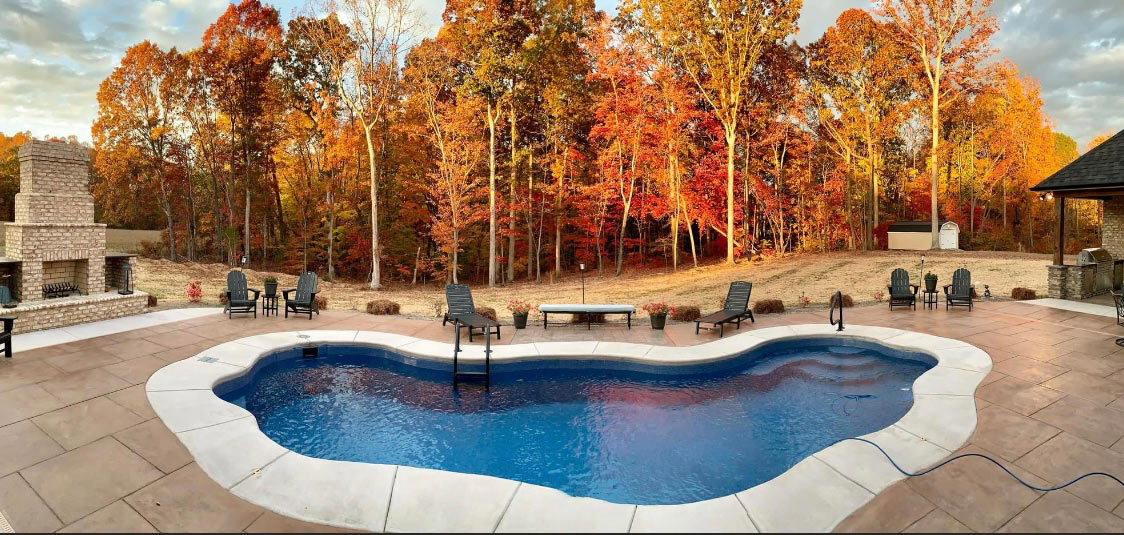
Maintenance
If you opt for a fiberglass pool, you can expect lower maintenance compared to older concrete models. Fiberglass pools can look as glistening and glorious as the day it was first installed for many years if well-maintained. You can expect some weekly maintenance tasks alongside some more seasonal pool chores to keep your pool looking its best and giving you many years of use.
Weekly pool maintenance tasks
- Check water levels and refill your pool as-needed if water evaporates
- Pro tip: Adding a cover to your pool can help save on energy costs and conserve water by minimizing evaporation
- Check your water chemistry levels and pH
- Skim your pool a few times per week
- Scrub and/or vacuum your pool twice per week
- Empty your filter basket weekly, and especially after large gatherings or pool parties
- Set your filter on a regular schedule, allowing it to run for at least six hours per day during prime pool season
Monthly / periodic pool maintenance tasks:
- Test your pool’s water chemistry, making sure your pool’s pH and alkalinity are balanced, as well as testing for calcium hardness
- Clean your filter regularly and back-flush your filtration pipe
- Check your pool for cracks and stains
- Remove stains promptly to keep your pool looking its best
Inground Vinyl Liner Pools in North Carolina
While fiberglass pools are popular with many North Carolina homeowners, vinyl liner pools also give them a run for their money, proving equally as beloved thanks to their affordable price tag and durability. To help you make the right choice for your new or remodeled pool, we’ll walk you through the benefits of vinyl liner pools, what to expect during the installation process, how to properly maintain your vinyl liner pool and the wealth of options these pools offer.
Vinyl Liner Pool Designs for Your North Carolina Home
Vinyl liner pools come in a variety of shapes and sizes. Not only are they an affordable option, but also allow for almost limitless customization and add-ons, capable of enhancing your outdoor lifestyle.
If you already have a vinyl liner pool, you may be delighted to know that you can give it a makeover every few years by installing a new liner. If you plan on adding fun features – like bubblers, pool lights or tanning ledges, it’s best to plan those in conjunction with a vinyl liner replacement.
However, if you have an older concrete pool, a vinyl liner pool can be a far more low-maintenance option to give your pool a new lease on life. When pools first made a splash in North Carolina in the early 1900s, they were luxury items for the wealthy. Gradually, pool ownership became more accessible to middle-class and working families. Today, roughly 1 out of every 6 homes in North Carolina has a pool. Some of these older pools are concrete, which requires a fair amount of upkeep. Replacing an older concrete model with a vinyl liner pool can be a more cost-effective option that also rewards you with a less intensive maintenance regimen!
Vinyl Liner Pool Installation Process
Getting a new pool is exciting. But before you’re able to enjoy countless barbecues with friends and family or anticipate a relaxing soak after a hard day at work, it needs to be installed first. Your pool builder will work with you to set expectations and help you understand what’s required, as well as offer up a timeline, but here’s a brief overview of the vinyl liner pool installation process:
- Measure the area for your pool.
Before any work begins, your builder will measure the area for your pool. This will include the area for your pool itself, as well as the area for any decking or surrounding features. Measuring the areas will also help your builder submit the proper paperwork and obtain all necessary permits to begin work and be sure your new vinyl liner pool is compliant with all state and local building codes. - Survey your property and apply for permits.
Before applying for permits, your builder will assess your backyard to be sure there aren’t any buried water or electrical lines, as well as any overhead utilities. They’ll also assess your land, making sure your soil can support a pool or look for any geographic features that may impact the pool installation process. From there, your builder will obtain all necessary permits before work can begin. - Digging.
Once permits have been obtained, your contractor will then begin excavating the area where your pool will sit. - Building a steel frame.
Once your pool area has been excavated, your builder will fabricate a steel frame for your pool. - Pour concrete to secure the steel frame.
Your builder will pour concrete to hold the steel frame in place, forming the shell of your pool. - Add and align a new liner.
Once the concrete has cured and your pool’s frame is in place, it’s time to add in a liner. Liners come in a variety of patterns and colors, which give your pool its unique look. Need some inspiration? Try our vinyl liner visualizer tool to test drive how a liner will look before buying! - Smooth liner wrinkles.
Before sealing the liner, your builder will smooth out any wrinkles in the liner, giving it a polished appearance. They’ll also be sure the liner is neither too tight or too loose, as either can cause your liner to more easily tear. - Seal the liner in place and fill your pool.
Your pool builder will use a liner vacuum to be sure your liner is free from any air leaks before filling your pool with water. The volume of water will also help seal your liner. Once the liner is set, your builder will trim away any excess, giving your pool a polished appearance.
Replacing Vinyl Liners or Reshaping Your Pool
Pool owners sometimes decide to replace a liner or reshape their pools for a number of reasons. On average, a well-maintained vinyl liner will last for 10 years, and will need to be replaced due to natural wear and tear from years of use. In other instances, pool owners want to change the color of their pool or have a totally different vision in mind for their backyard oasis. Changing your pool liner can be one of the easiest ways to give it a makeover!
In other instances, you may want to change the shape or depth of your pool, which is a more involved process than just swapping out a new liner. Reshaping your pool can allow you to make your pool deeper or shallow, or offer more room for a variety of features. For instance, if you have small children or adults with mobility issues using your pool, you may want to create more shallow areas or add multiple entry and exit points with non-slip steps.
On the flip side, if the kids are grown and you have free reign of the pool to yourself, reshaping your pool to reshape your new lifestyle can be a great idea. Changing the shape of your pool can help accommodate more add-ons, like a spillover spa or tanning ledge to entertain guests and give your pool – and you – a fun-filled “second act”!
Automatic Pool Covers
An automatic pool cover can be a fantastic investment that protects both your pool and your loved ones.
- Keep out debris and minimize maintenance. Adding an automatic pool cover to your pool can help keep leaves, insects and debris out of your pool. This is especially helpful during North Carolina’s hurricane season, which spans between August and October, when weather conditions can dump all sorts of unpleasantries in your pool. In addition to protecting your pool from unwanted debris, an automatic pool cover means less time spent on skimming and vacuuming your pool and more time enjoying it.
- Conserve natural resources & lower energy costs. An automatic pool cover can reduce water evaporation. Not only does this mean that you don’t have to refill your pool as frequently – which also translates to rebalancing your water chemistry and pH, but it also helps to maintain water temperature. Based on research from the U.S. Department of Energy, an automatic pool cover can save you between 50% and 70% on your energy bills.
- Added safety and legal requirements. Automatic pool covers aren’t just a good idea to help keep your pool cleaner and use fewer resources. In some instances in North Carolina, having an automatic safety cover for your pool is the law if an outer wall of your home pulls double-duty as a barrier around your pool. An automatic pool cover can help prevent children and pets from accidentally falling in when your pool is unattended, averting a tragedy. In addition to helping to keep your loved ones safe, an automatic pool cover can also serve as a deterrent against unauthorized use of your pool in the event someone decides to hop your fence and use your pool without your knowledge.
Vinyl Liner Pool Maintenance in North Carolina
Sticking to a regular maintenance schedule for your vinyl liner pool will help you get many years of enjoyment from it. Here are a few vinyl liner maintenance tips to keep in mind:
- Check your water chemistry. Regularly checking and balancing your water chemistry is important to keeping your pool water at optimum pH levels, as well as preventing algae from blooming.
- Do not allow chemicals to come in contact with your liner. When adding chemicals to balance your pool water, be sure to keep them away from making direct contact with your vinyl liner itself. Certain chemicals can damage your liner, causing you to have to replace it sooner.
- Regularly brush your liner with a soft-bristle brush. To keep your vinyl liner pool looking its best, give it a gentle scrub with a soft brush each week. This can help minimize stains, remove dirt and prevent chemical deposits from building up on the surface of your liner. The better you take care of your liner, the more longevity you’ll get from it!
- Use only pool-safe toys. From soft foam pool noodles to inflatable floats, there are plenty of toys made for fun in the pool. To help protect your liner, avoid any toys or pool furniture with sharp, hard edges. These can damage or tear your liner.
- Smooth out any liner wrinkles. Over time, your vinyl liner may develop wrinkles. These are not cause for alarm, but can add an unsightly appearance to your pool or worsen if not corrected. You can smooth out these wrinkles yourself by carefully using your feet to spread them more evenly throughout the surface of your liner, or even walking them into the corner of your pool. If you’re worried about risking damage to your pool, you can request assistance from a professional to expertly handle them.
- Check for leaks. Sometimes, wrinkles in your liner can indicate a leak. If you do see any tears in your liner, be sure to patch it as soon as possible. You may be able to do this yourself, or you can enlist the aid of a professional.
- Do not empty your vinyl pool completely. While many North Carolina pool owners can use their pools almost year-round, you may want to close your pool in anticipation of a harsh winter and before freezing temperatures set in. If you plan to winterize your pool, you should only partially drain it. Draining your vinyl liner pool completely can cause damage to your liner, causing it to shrink or tear. Do not drain your vinyl liner pool more than half of its total volume to ensure you don’t have an unpleasant surprise when it’s time to refill and reopen your pool in the spring!
North Carolina Pool FAQs
How much does an inground pool cost in North Carolina ?
The cost of an inground pool in North Carolina varies due to a number of factors, including the size and material of your pool, the size of your yard and specialized equipment that may be needed to install your pool, as well as geographic features such as the soil and grade of your yard. Add-on features, such as tanning ledges, bubblers and pool covers can also impact the final cost of your pool. Working with an expert builder can help you better understand your costs up-front and help you budget for a beautiful new pool.
What type of inground pool is best for North Carolina?
Fiberglass pools and vinyl liner pools have grown in popularity in recent years due to their nearly endless potential for customization, good looks and ease of maintenance. Fiberglass pools, in particular, can be installed relatively quickly, allowing you to dive on into your beautiful new pool sooner.
“Fiberglass cost vs vinyl or concrete are definitely the most efficient for longevity of a pool. Fiberglass is also a great fit for North Carolina because of all the various soil types across the state,” observes Jarret Cope of Magic Pools and Spas.
On the other hand, he notes that “vinyl pools are a great option for North Carolina residents looking to do customization on a budget. Vinyl pools fit most needs as they allow the customer to dream up almost anything. Vinyl is also a great option for customers looking to change the look of their pool every 10 years or so.”
Ultimately, the choice for which inground pool is best for you and your needs is up to you. Working with an experienced professional pool builder can help you get some expert advice on choosing a pool that you’ll enjoy for years to come.
Do I need a permit to install a pool in North Carolina?
You need a permit to install a pool in North Carolina. It’s important to note that the North Carolina State Building Code defines a pool as any structure that contains water with a minimum depth of 24 inches. This includes not just in-ground and above-ground pools, but also spas and hot tubs.
It’s important to check with your state and local building offices to confirm what permits you may need in order to start constructing your pool, as ordinances and requirements may vary. For instance, Raleigh, North Carolina requires both a building and electrical permit to install a pool, as well as a plumbing permit and backflow device if the pool connects to a water supply on the property. Be sure to do your homework and investigate what permits are required to be sure your pool is compliant with all state and local regulations. Working with a reputable pool company and builder can help you better navigate what’s required of your pool, as they’re familiar with the latest regulations.
Is it worth it to install a pool in North Carolina?
It sure is! If you live in North Carolina, installing a pool can make you the envy of your neighborhood. Looking ahead to the future, a well-maintained pool can increase the resale value of your home. Homelight’s Top Agent’s Insights Report for 2021 notes that, in recent years, an inground swimming pool can help increase the value of a property by 69%, on average and that a home with a pool can command roughly $27,000 more, depending on the area. Even if you’re not looking to sell your home in the future – or ever, adding a pool can give you countless opportunities to make priceless memories with loved ones year after year.
Do I need to winterize my pool in North Carolina?
North Carolina has typically mild winters. Snow and ice do not pose a threat to Tarheel State residents compared to other parts of the country. Most NC pool owners can use their pools year-round and often don’t need to winterize their pools, plumbing or drain their filtration systems. However, pool owners in mountain areas of the state may want to consider pool winterization in the event of cold snaps and possible snow.
How close can a pool be to a property line in North Carolina?
Rules and regulations for a minimum distance of a pool from a property line may vary from town to town in North Carolina, so it’s important to confirm with your local building office to ensure your pool is compliant. For instance, in Dare County, NC, a swimming pool and all components (including a pool apron) must be at least five feet from the side or rear property line. On the flipside, Spencer, NC requires that residents keep pools at least 10 feet from any lot line and that they cannot be located in a front or side yard – relegating them solely to backyards.
How long will a fiberglass pool last in North Carolina?
A well-maintained fiberglass pool can last between 25 to 30 years – possibly longer, depending on how well you take care of it. Fiberglass pools are more than just a joy to behold for the senses, they’re easy to maintain and can give you years of enjoyment.
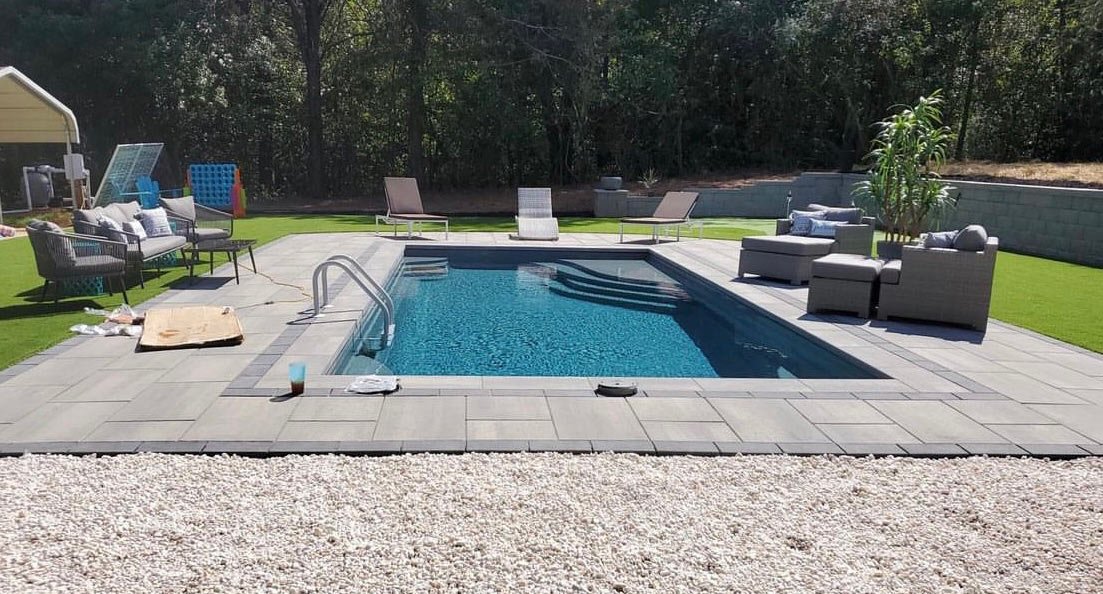
North Carolina Inground Installation Areas
Latham proudly serves many cities, towns, and regions throughout North Carolina. We’re pleased to have helped many happy customers add a beautiful new pool to their backyards in such areas as:
- Greenville, NC
- Raleigh, NC
- Jacksonville, NC
- Florence, NC
- Columbia, NC
- Statesville, NC
- Kannapolis, NC
- Concord, NC
- Monroe, NC
- Winston-Salem, NC
- High Point, NC
- Charlotte, NC
- Fayetteville, NC
- Hickory, NC
- Lenoir, NC
- Wilmington, NC
- Greensboro, NC
- Clayton, NC
- Cary, NC
- Corolla, NC (Outer Banks)
- Nags Head, NC (Outer Banks)
- Rockingham, NC
Start Your Pool Project in North Carolina Today
There’s nothing quite like having a beautiful new pool gracing your backyard. Make backyard barbecues and long, lazy days off from school (and work!) even better with a beautiful new pool gracing your backyard. Join the thousands of happy customers who love their Latham pool and talk with an expert builder today to make the pool of your dreams a reality!

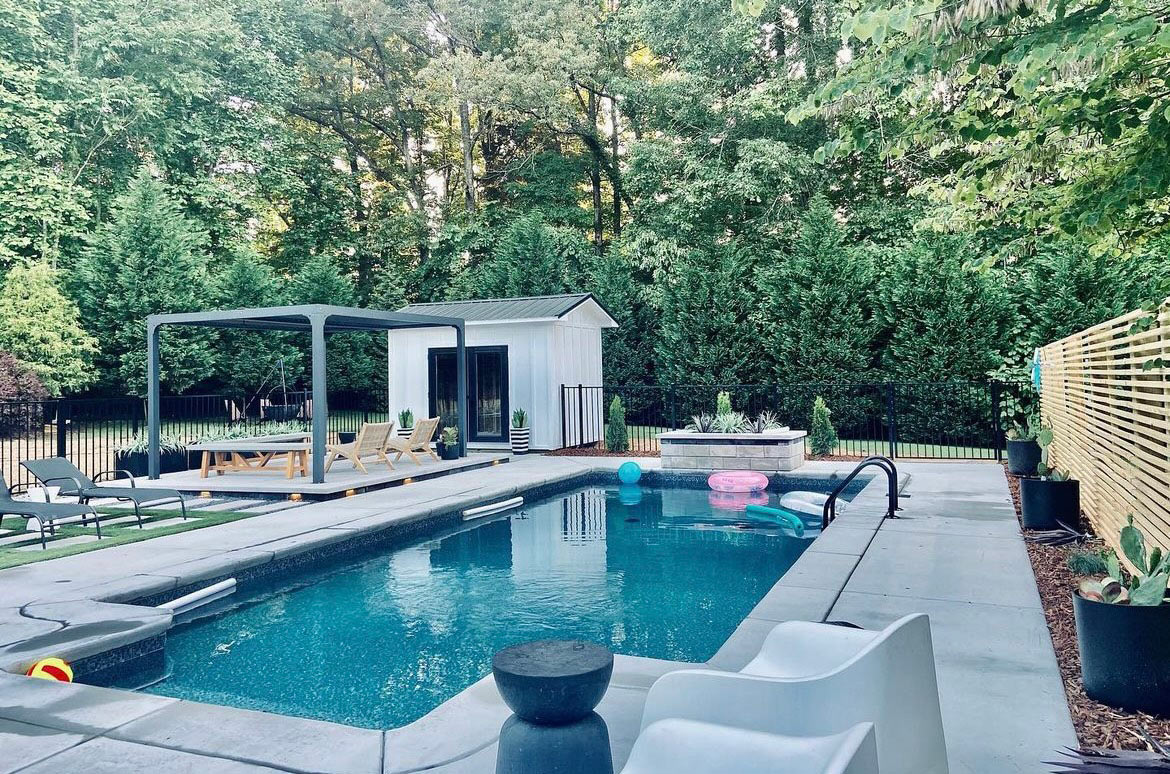

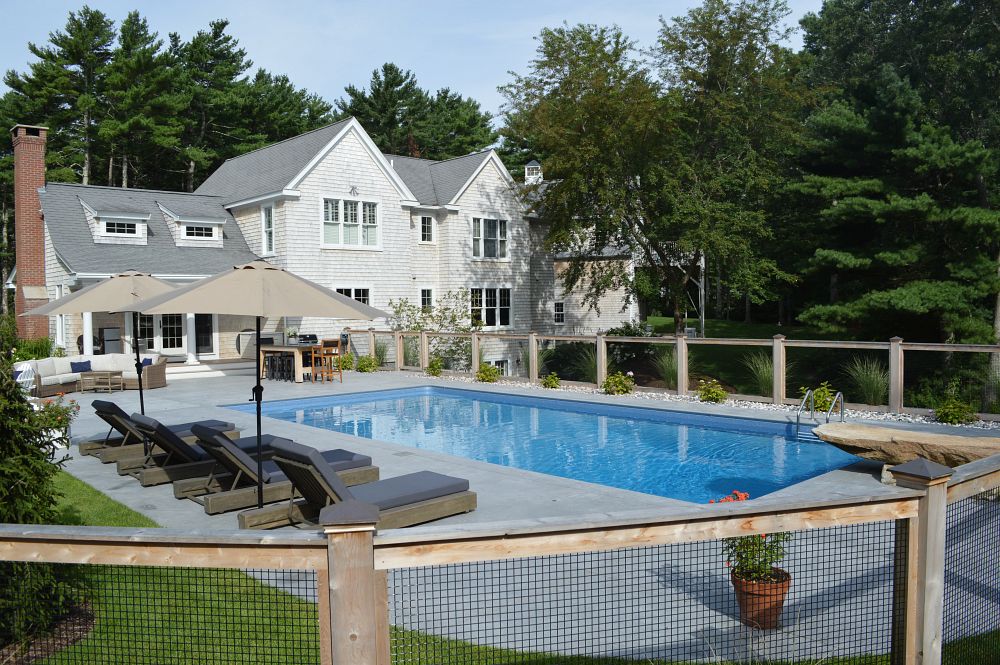
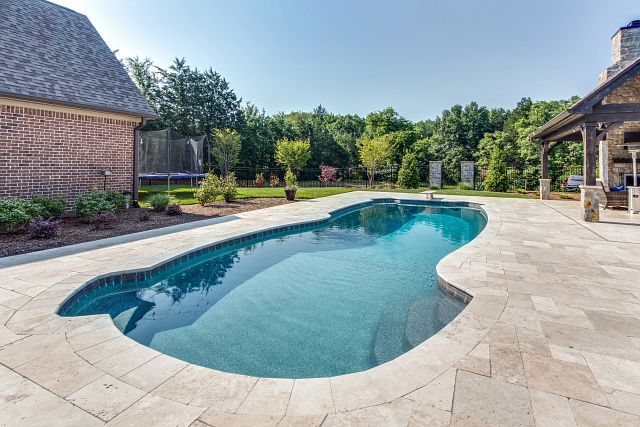
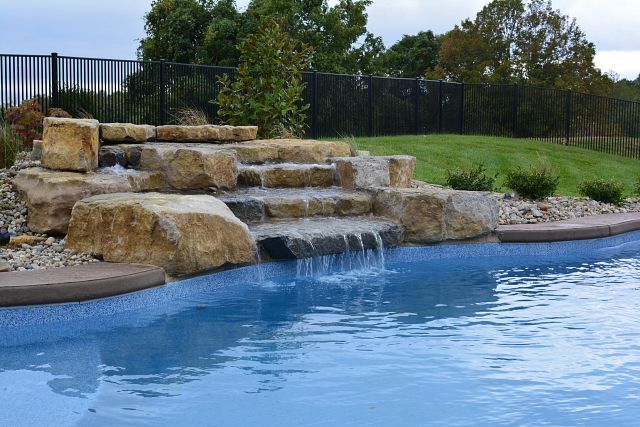
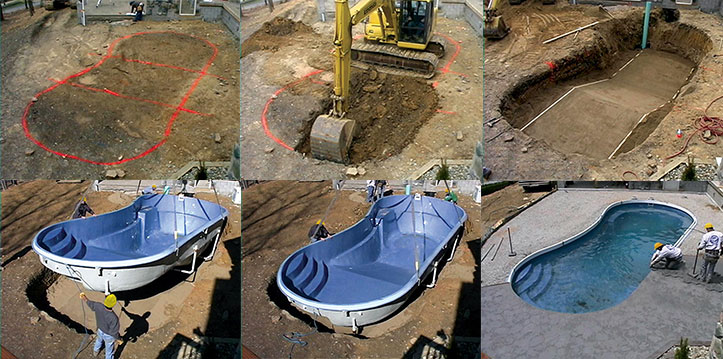
Join the discussion